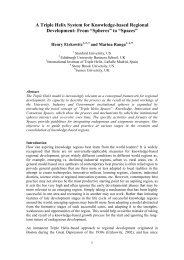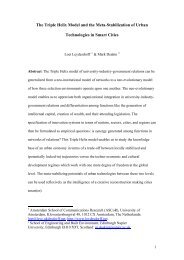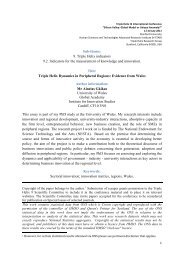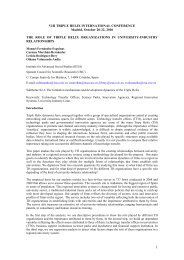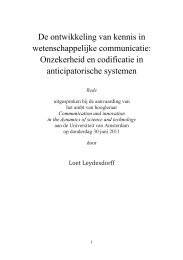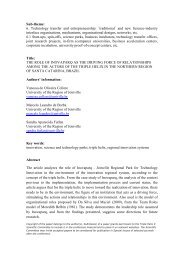o-027_towards overcoming the innovation chasm in botswana
o-027_towards overcoming the innovation chasm in botswana
o-027_towards overcoming the innovation chasm in botswana
Create successful ePaper yourself
Turn your PDF publications into a flip-book with our unique Google optimized e-Paper software.
Fur<strong>the</strong>rmore, of <strong>the</strong> 83 patent applications received by <strong>the</strong> Registrar of Companies and Intellectual<br />
Property (ROCIP), <strong>the</strong> authority responsible for <strong>in</strong>tellectual property management <strong>in</strong> Botswana between<br />
<strong>the</strong> periods 2006-2011, only 15 applications were submitted by locals and out of this, only 1 patent was<br />
granted (C.P Masena, 2011, Personal Communication). While <strong>the</strong> results of <strong>the</strong> above studies largely<br />
confirm Botswana’s excellent performance compared to her peers on <strong>the</strong> African cont<strong>in</strong>ent, <strong>the</strong> results<br />
none<strong>the</strong>less reveal <strong>the</strong> extent of <strong>the</strong> <strong><strong>in</strong>novation</strong> <strong>chasm</strong> <strong>in</strong> Botswana when compared to contemporary<br />
<strong><strong>in</strong>novation</strong>s systems elsewhere. The f<strong>in</strong>d<strong>in</strong>gs potentially po<strong>in</strong>t to some of <strong>the</strong> areas that deserve fur<strong>the</strong>r<br />
attention from <strong>the</strong> po<strong>in</strong>t of policy <strong>in</strong>terventions <strong>in</strong> order to fur<strong>the</strong>r improve its competitiveness at <strong>the</strong> global<br />
stage <strong>in</strong> <strong>the</strong> relevant areas. In seek<strong>in</strong>g to address <strong>the</strong> <strong><strong>in</strong>novation</strong> <strong>chasm</strong>, a number of <strong>in</strong>stitutional and<br />
national strategic <strong>in</strong>terventions have been undertaken and are currently be<strong>in</strong>g undertaken. The<br />
government of Botswana has recognized <strong><strong>in</strong>novation</strong> as one of <strong>the</strong> ma<strong>in</strong> pillars of its efforts <strong>towards</strong><br />
diversify<strong>in</strong>g <strong>the</strong> national economy which is predom<strong>in</strong>antly based on <strong>the</strong> exploitation of m<strong>in</strong>eral resources.<br />
Such recognition is evident foremost <strong>in</strong> its establishment of <strong>the</strong> Botswana Innovation Hub (BIH), <strong>the</strong><br />
establishment of a second public university christened <strong>the</strong> Botswana International University of Science<br />
and Technology (BIUST), <strong>the</strong> accentuation of <strong>the</strong> roles and responsibilities of technology based public<br />
<strong>in</strong>stitutions such as <strong>the</strong> Botswana Technology Centre (BOTEC), <strong>the</strong> Rural Industries Promotions<br />
Company (RIPCO), <strong>the</strong> Rural Industries Innovations Centre (RIIC) and o<strong>the</strong>r government-orchestrated<br />
<strong><strong>in</strong>novation</strong> support agencies such as <strong>the</strong> Local Enterprise Authority (LEA), <strong>the</strong> Citizen Entrepreneurial<br />
Development Agency (CEDA) and <strong>the</strong> Botswana Bureau of Standards (BOBS). O<strong>the</strong>r <strong>in</strong>terventions have<br />
been at <strong>the</strong> legislative and policy levels and <strong>in</strong>volve <strong>the</strong> review of relevant pieces of legislation and <strong>the</strong><br />
development of new policies. Institutionally, various public government <strong>in</strong>stitutions have begun <strong>the</strong><br />
process of self-evaluation <strong>in</strong> view of mak<strong>in</strong>g <strong>the</strong>ir own contributions <strong>towards</strong> enhanc<strong>in</strong>g <strong><strong>in</strong>novation</strong> and<br />
bridg<strong>in</strong>g <strong>the</strong> national <strong><strong>in</strong>novation</strong> <strong>chasm</strong>. Some of <strong>the</strong> national strategic <strong>in</strong>terventions and <strong>in</strong>stitutional<br />
<strong>in</strong>terventions are discussed <strong>in</strong> <strong>the</strong> follow<strong>in</strong>g sections.<br />
The Botswana Tra<strong>in</strong><strong>in</strong>g Authority (BOTA)<br />
Recogniz<strong>in</strong>g <strong>the</strong> poor quality of <strong>the</strong> skills output from vocational, educational and tra<strong>in</strong><strong>in</strong>g <strong>in</strong>stitutions,<br />
which failed to meet <strong>the</strong> grow<strong>in</strong>g demand for specialized skills by <strong>the</strong> <strong>in</strong>dustry <strong>in</strong> Botswana, <strong>the</strong><br />
government set up <strong>the</strong> Botswana Tra<strong>in</strong><strong>in</strong>g Authority <strong>in</strong> 2000 to act as regulatory body to coord<strong>in</strong>ate and<br />
monitor tra<strong>in</strong><strong>in</strong>g provided by tra<strong>in</strong><strong>in</strong>g <strong>in</strong>stitutions (BOTA, 2010). The ma<strong>in</strong> objectives of <strong>the</strong> Authority are to<br />
coord<strong>in</strong>ate vocational tra<strong>in</strong><strong>in</strong>g activities <strong>in</strong> view of realiz<strong>in</strong>g better <strong>in</strong>tegration and harmonization of<br />
vocational tra<strong>in</strong><strong>in</strong>g activities <strong>in</strong> <strong>the</strong> country, monitor and evaluate <strong>the</strong> performance of vocation tra<strong>in</strong><strong>in</strong>g and<br />
provide policy advice <strong>in</strong> <strong>the</strong> same doma<strong>in</strong> <strong>in</strong> order to ensure <strong>the</strong> success of all vocational tra<strong>in</strong><strong>in</strong>g<br />
programs <strong>in</strong> <strong>the</strong> country (BOTA, 2010).<br />
The Botswana National Productivity Center (BNPC)<br />
Respondents <strong>in</strong> a recent study <strong>in</strong>dicated <strong>in</strong>efficient government bureaucracy, <strong>in</strong>adequately educated<br />
workforce, and access to f<strong>in</strong>ance, poor work ethic <strong>in</strong> national labour force, restrictive labour regulations<br />
and <strong>in</strong>flation as <strong>the</strong> most restrictive factors for do<strong>in</strong>g bus<strong>in</strong>ess <strong>in</strong> Botswana (Figure 3).<br />
7




